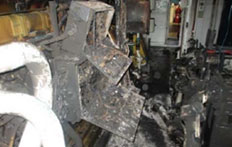A serious engine fire occurred on a vessel. The incident resulted in no personal injuries, but the potential for harm was great.
 The vessel was sailing as normal when a fire was automatically detected in the engine room. The fire was then confirmed visually by the chief engineer and the crew was mustered. Everybody onboard was accounted for at the muster station a few minutes later.
The vessel was sailing as normal when a fire was automatically detected in the engine room. The fire was then confirmed visually by the chief engineer and the crew was mustered. Everybody onboard was accounted for at the muster station a few minutes later.
The crew decided to start the CO2 firefighting system and closed all doors into the engine room. They also decided to set anchor because the vessel was at this point drifting not far from the shore.
Both these actions contributed in reducing the damage of the fire and the risk of grounding. The critical situation was handled in a professional manner. The vessel was no longer drifting, the fire was dealt with, and help was on its way.
 Causes of fire
Causes of fire
- A turbo housing or supply pipe for lube oil to the turbo had come loose, which caused a lube oil leakage.
- The lube oil was ignited either in the turbo housing or by contact with the exhaust manifold on the exhaust‐side of the turbo.
- The underlying causes are unknown, but some of the below aspects were discussed;
High vibration, poor work by service supplier (engine was overhauled 1100 hours ago), lack of monitoring of bolts, or a combination of these factors.
Consequences
The crew was not injured and grounding of the vessel was avoided through swift and professional actions made by the onboard crew.
The vessels engine room experienced major damages, extensive repairs are needed, and some part have to be replaced.
Company actions and recommendations
- Experience transfer was sent out to all company vessels requesting that the accident must be discussed in a separate meeting with the vessel crew with focus on learning from this accident.
- All vessels had to conduct a risk assessment on fire onboard ship.
- Maintenance jobs occurring in the maintenance system had to be evaluated. It might be necessary to increase the monitoring of specific part of the engine.
- Emphasize good follow up of service suppliers in the maintenance program.
- A separate unscheduled job should be done to ensure that turbos on all vessels are mounted according to specifications from manufacturer.
Lessons learned
- Fire drills are very important in order to be prepared for a serious accident. A good handling of a situation is most likely a result of good training onboard, and the ability to keep calm in situations when they happen.
- The company’s emergency group onshore must also be prepared. The work done onshore, as well as the work done onboard, must be conducted in a calm and professional manner.
- Different organizations can be used and may be of great help when a company has a vessel in distress.
- The monitoring and follow up of service suppliers is very important.
